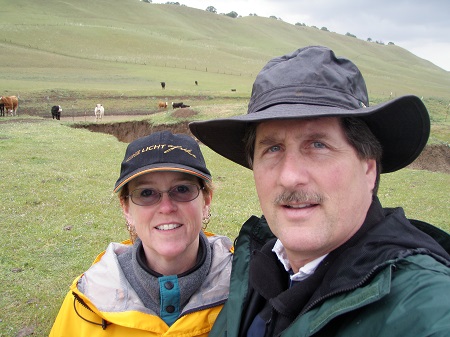CNDDB would like to feature Trish and Greg Tatarian on our Contributor Spotlight, where we take time to thank data submitters for all their work in helping the CNDDB better represent the rare species we track.
 Today’s Contributor Spotlight features Trish & Greg Tatarian, an inspiring couple who jointly own and operate Wildlife Research Associates (WRA), a Bay Area-based ecological consulting firm. Together, they have contributed over 300 source documents to CNDDB, which have provided data for hundreds of wildlife occurrences. In turn, they use CNDDB data at the start of almost every project during CEQA document preparation.
Today’s Contributor Spotlight features Trish & Greg Tatarian, an inspiring couple who jointly own and operate Wildlife Research Associates (WRA), a Bay Area-based ecological consulting firm. Together, they have contributed over 300 source documents to CNDDB, which have provided data for hundreds of wildlife occurrences. In turn, they use CNDDB data at the start of almost every project during CEQA document preparation.
When Greg started WRA in 1991, his focus was humane wildlife damage control, and research on artificial roosts for bats. Trish, an amphibian expert, joined in 2000, opening WRA’s horizons to a multi-species approach. As a team, they have made great advances in bat avoidance and mitigation measures in the consulting world, and helped educate agency and independent biologists through California red-legged frog workshops they conducted for many years. Greg’s recent  Conservation Lecture Series presentation on bat conservation further demonstrates the couple’s commitment to education.
Conservation Lecture Series presentation on bat conservation further demonstrates the couple’s commitment to education.
They share a lifelong fascination with wildlife. Trish worked for years in wildlife rescue, while Greg’s passion for helping wildlife started with the coral reef aquarium industry, and a mentor who introduced him to humane solutions to human-wildlife conflicts. Trish’s personal career highlights thus far include peregrine falcon reintroduction efforts and California red-legged frog research throughout the state. In addition to his other work with bats, Greg is happiest when helping conserve bat species and their habitat through designing on- and in-structure bat roost replacement habitat for bridge upgrade/replacement projects.
Trish and Greg have tons of good advice for aspiring biologists! Here are some highlights:
Trish: “Try and get as much experience as possible from a wide variety of people... being a generalist is often more rewarding than being a species specialist. The more you look, the more you will see.”
Greg: “Volunteer for short-term projects for a wide range of species… you’ll learn so much from the specialists and those with extensive experience that will transfer to whatever field work you later conduct. Try to come to an understanding with yourself early on whether you have a strong desire to work in the field… field work isn’t for everyone, but it provides a set of experiences and observations that are unique.” As for co-owning a business with one’s spouse: “Field work is very rewarding as a team… it also helps that we get along well, which explains how we could live together on a 37’ sailboat for 10 years.”
When asked if they have a favorite plant or animal that they’ve worked with, Greg and Trish answered unanimously, like true field biologists: “Whichever one is in my hand!”
We thank the Tatarians for sharing their field data with CNDDB. Find them online at  www.wildliferesearchassoc.com.
www.wildliferesearchassoc.com.
Want to be featured in CNDDB’s Contributor Spotlight? Contact Rachel at Rachel.Freund@wildlife.ca.gov.